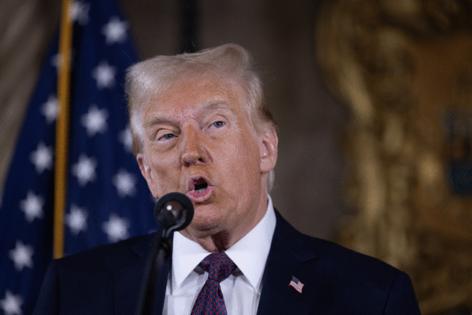Can Trump actually rename the Gulf of Mexico? Here's what he can do, and what he can't
Published in Political News
WASHINGTON — President-elect Donald Trump said this week he intends to rename the Gulf of Mexico once he takes office — but experts say his power to do so will only take him so far.
As president, little is stopping Trump from directing federal agencies to adopt the use of his preferred name for the ocean basin, the “Gulf of America.” But the formal process of renaming territories, both at home and abroad, would take greater effort.
“We’re going to be changing the name of the Gulf of Mexico to the Gulf of America, which has a beautiful ring. That covers a lot of territory,” Trump told reporters at his Mar-a-Lago estate on Tuesday. “The Gulf of America — what a beautiful name. And it’s appropriate! It’s appropriate.”
There is, in fact, a federal agency in charge of maintaining “uniform geographic name usage throughout the federal government,” called the United States Board on Geographic Names. That government board, housed in the U.S. Department of the Interior, “discourages name changes unless there is a compelling reason,” according to its website.
“Changing a name merely to correct or re-establish historical usage is not in and of itself a reason to change a name,” the board’s website says.
Congress could pass legislation endorsing the proposal, compelling reason or not. Recognizing Congress’ role, Rep. Marjorie Taylor Greene, a Republican from Georgia and close Trump ally, vowed to introduce legislation codifying the name change within minutes of the president-elect’s remarks.
But U.S. jurisdiction over the gulf only extends 12 miles from U.S. coasts over its territorial waters, further complicating any American effort to compel outside entities to respect a name change over the 600,000 square-mile region.
“Long story short: Trump’s assertion that the U.S. can rename the Gulf of Mexico is legally dubious and, even if it were legal, would require Congress,” said Peter Kastor, chair of the History Department at Washington University in St. Louis, referencing a comparatively similar effort to label Lake Champlain the country’s “Sixth Great Lake” in the late 1990s.
“The president’s powers on this matter are both limited and expansive,” Kastor said. “The U.S. has the power to change the name of spaces that it formally governs. Localities change their names. Congress likewise has named and renamed federal territories. This process goes back to the dawn of the republic. But renaming international waters is a very different matter.”
Regardless of U.S. government actions, entities outside of federal government control — including state and local governments, media organizations, and private companies with mapping software such as Apple and Google — can choose to keep or rename the Gulf of Mexico at their own discretion.
Even if Congress and the BGN were to adopt Trump’s proposed change, the new president would then have to convince the United Nations Group of Experts on Geographical Names to change the name to encourage international use — a tall order for a region that has maintained the same name since 1700.
“Because it is international territory, his options are solely performative ones,” said Jack Davis, author of the Pulitzer Prize-winning book, "The Gulf: The Making of an American Sea." “Sure, Congress can pass legislation to rename the Gulf of Mexico. But that doesn’t mean the international community will follow.”
“The suggestion here from this whole proposal is that the U.S. owns the Gulf of Mexico, like it owns the Rocky Mountains. And of course, it doesn’t. So it would amount to nothing but show,” Davis said. “It strikes me on several levels as odd.”
It is not the first time Trump has sparked controversy by attempting to change geographic names. During his first term, the Trump administration removed references to “Palestinian territories” and use of the word “occupied” from all State Department reports and press releases regarding Israel and the disputed territories of Gaza and the West Bank. The use of those terms returned under the Biden administration.
©2025 Miami Herald. Visit at miamiherald.com. Distributed by Tribune Content Agency, LLC.




























































Comments